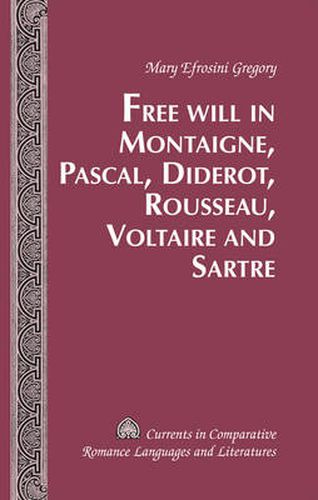Readings Newsletter
Become a Readings Member to make your shopping experience even easier.
Sign in or sign up for free!
You’re not far away from qualifying for FREE standard shipping within Australia
You’ve qualified for FREE standard shipping within Australia
The cart is loading…






This title is printed to order. This book may have been self-published. If so, we cannot guarantee the quality of the content. In the main most books will have gone through the editing process however some may not. We therefore suggest that you be aware of this before ordering this book. If in doubt check either the author or publisher’s details as we are unable to accept any returns unless they are faulty. Please contact us if you have any questions.
Free Will in Montaigne, Pascal, Diderot, Rousseau, Voltaire and Sartre takes the reader on a journey through the corridors of time to explore the evolution of thought regarding free will. The arguments and works presented in this volume raise critical and timeless issues for ethicists, the criminal justice system and the responsible citizen. Montaigne held that humans can break out of the determinist confines of their given cultures and acquired habits by employing reason, welcoming change and promoting education. In The Nun, Diderot chronicles portraits of pathology, records symptoms and leaves it up to the reader to decide whether the unfortunate victims are products of nature, nurture or both. Rousseau thought that civilized man, having joined society, surrenders his free will to the general will to enjoy protection of his person, family and property. Sartre, an indeterminist, averred that since humans have the capacity to be self-reflective, they can exercise creativity with regard to who and how they choose to be from moment to moment. Freud observed that we are marionettes whose strings are commandeered by various realms competing for dominance - the conscious and subconscious; id, ego and superego. Bernays, Freud’s nephew, employed psychoanalytic theory as a tool to advise corporations how to entice the public to purchase their products when confronted with a range of choices. This book opens the door to lively classroom discussion on moral issues. French literature, philosophy, psychology and political science classes will find it an invaluable source presenting a wealth of views on free will.
$9.00 standard shipping within Australia
FREE standard shipping within Australia for orders over $100.00
Express & International shipping calculated at checkout
This title is printed to order. This book may have been self-published. If so, we cannot guarantee the quality of the content. In the main most books will have gone through the editing process however some may not. We therefore suggest that you be aware of this before ordering this book. If in doubt check either the author or publisher’s details as we are unable to accept any returns unless they are faulty. Please contact us if you have any questions.
Free Will in Montaigne, Pascal, Diderot, Rousseau, Voltaire and Sartre takes the reader on a journey through the corridors of time to explore the evolution of thought regarding free will. The arguments and works presented in this volume raise critical and timeless issues for ethicists, the criminal justice system and the responsible citizen. Montaigne held that humans can break out of the determinist confines of their given cultures and acquired habits by employing reason, welcoming change and promoting education. In The Nun, Diderot chronicles portraits of pathology, records symptoms and leaves it up to the reader to decide whether the unfortunate victims are products of nature, nurture or both. Rousseau thought that civilized man, having joined society, surrenders his free will to the general will to enjoy protection of his person, family and property. Sartre, an indeterminist, averred that since humans have the capacity to be self-reflective, they can exercise creativity with regard to who and how they choose to be from moment to moment. Freud observed that we are marionettes whose strings are commandeered by various realms competing for dominance - the conscious and subconscious; id, ego and superego. Bernays, Freud’s nephew, employed psychoanalytic theory as a tool to advise corporations how to entice the public to purchase their products when confronted with a range of choices. This book opens the door to lively classroom discussion on moral issues. French literature, philosophy, psychology and political science classes will find it an invaluable source presenting a wealth of views on free will.